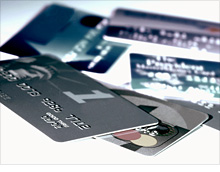Credit card reform leaves small biz out
Washington's credit card crackdown applies only to personal cards, leaving some small businesses unprotected.
 |
| The new Credit Card Accountability Responsibility and Disclosure Act applies only to personal cards, meaning small businesses that use corporate cards won't benefit from the new protections. |
NEW YORK (CNNMoney.com) -- When the Senate passed its credit-card reform bill on Tuesday, Senator Christopher Dodd called it "a great day for consumers." But what will it mean for small business owners who've been struggling with inflated rates and unexpected fees on their credit cards?
That depends on how your small business is incorporated, and what kind of card you have.
The Credit Card Accountability Responsibility and Disclosure Act that Obama will sign Friday outlaws several card policies that have provoked public outrage in recent months, including retroactive rate increases on existing balances for cardholders in good standing; hiking rates for new charges without at least 45 days' notice; "double-cycle billing," which allows fees to be charged for balances that were already paid off; and "universal default," which applies rate hikes if a customer is late with payments on unrelated bills.
While some of these provisions were already put in place by the Federal Reserve last December, they weren't scheduled to kick in until July 2010. Instead, the 45-day notice will now go into effect in mid-August of this year, with the rest of the changes being implemented next February.
For small businesses, however, there's a catch. Because the new law amends the Truth in Lending Act, which only governs consumer loans, it doesn't apply to corporate cards.
What this means is if you use your personal card to make business purchases, you'll be covered by the new protections. Likewise, business cards based on your personal credit - as is often the case for sole proprietors - should be covered as well.
But for limited liability corporations and other companies that use traditional corporate cards, the same old rules will continue to apply. An amendment proposed by Senators Mary Landrieu, D-La., and Olympia Snowe, R-Maine, to extend protections to any businesses with 50 or fewer employees was defeated in the Senate last week; instead, the final bill directs the Federal Reserve to conduct a study of credit-card use by small businesses.
As a result, no one is sure exactly how many small business owners will be affected by the new legislation. According to Chris Walters, manager of legislative affairs at the National Federation of Independent Businesses, 74% of small employers have business credit cards, but many of those "business" cards are based on the owner's personal credit - in which case, they're covered. Even some of those with business cards may still put some expenses on their personal plastic: 39% of those the NFIB surveyed said they use a personal credit card for business purposes.
The new law could result in "a couple of unintended effects," says Nolan Newman, a partner in a Seattle accounting firm that specializes in owner-operated businesses. While he doesn't expect business owners to start shifting to sole proprietorships just to avoid corporate cards, he does wonder if individuals may end up increasingly using personal cards to incur business expenses and having their incorporated companies reimburse them.
Regardless of the limitations, passage of the new law was applauded by many aggrieved cardholders.
"Carolyn Maloney is my new hero," says Frank Duran, a dentist in El Cajon, Calif., of the New York Representative who has fought for years for credit-card reform. Duran saw his rate hiked by Advanta from 7.99% to 30% despite having never missed a payment. Like most Advanta cardholders, Duran has an account based on his personal credit, and would be covered by the new restrictions.
Under current law, he notes, "they only have to give a 15-day notice that they're changing your terms, and they admit that it takes 10 days to get to you. So if you don't open your letter right away, read it, decide that you want to opt out and mail it right away, it's not going to make it in time."
Less sanguine is Reed Smith, who runs a deck-cleaning service in St. Peter's, Mo. Smith's Advanta card rate leapt from 10.9% to 39% just last month, while his Discover went from 8.9% to 18.9%. He noted that nothing in the new law will restrict the rates or fees charged by card companies. The credit card industry successfully lobbied to kill proposals to set rate caps on credit cards and other loans.
"I don't think it's going to stop the credit card companies from arbitrarily raising an interest rate," says Smith. "What Congress really needs to do is pick an interest rate, lock all these credit cards in on that one interest rate, and if you qualify, you get the interest rate same as your neighbor across the street." ![]()
Credit cards gone wild: Shocking rate hikes
What credit card legislation means for you
The credit card company everybody hates
-
The Cheesecake Factory created smaller portions to survive the downturn. Play
-
A breeder of award-winning marijuana seeds is following the money and heading to the U.S. More
-
Most small businesses die within five years, but Amish businesses have a survival rate north of 90%. More
-
The 10 most popular franchise brands over the past decade -- and their failure rates. More
-
These firms are the last left in America making iconic products now in their twilight. More









